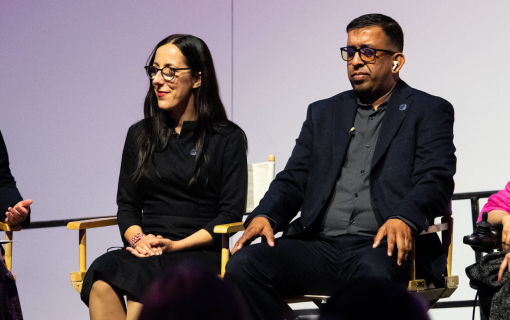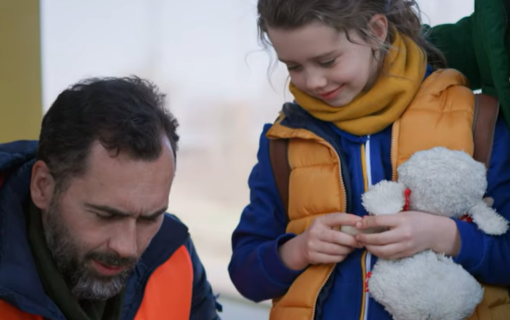Workshop Success Stories in Kosovo
Stakeholders Agree on Activities to Improve Electoral Access for Persons with Disabilities
Community attitudes and a lack of access to information and infrastructure, particularly buildings and transport, are significant barriers that the estimated 200,000 persons with disabilities in Kosovo face. As part of a project funded by the U.S. Agency for International Development, the International Foundation for Electoral Systems (IFES) and its partner Kosovar civil society organizations (CSOs), Kosovo Democratic Institute (KDI) and HandiKOS, are working to develop a more inclusive electoral process.
For the June 2014 National Assembly elections, KDI and HandiKOS fielded 230 persons with disabilities (of whom 37 percent were women) as either long- or short-term observers to monitor access for persons with disabilities in all facets of the electoral process, including election planning, electoral and political information, political campaigns and voting on Election Day. The report stemming from this first Disability Access Monitoring Mission (DAMM) in Kosovo, released in three languages and Braille, is now forming the basis for a sensitization and advocacy campaign that mobilizes CSOs managed by and for persons with disabilities. The CSOs will work with electoral institutions, political parties and relevant government authorities to increase electoral access for persons with disabilities throughout Kosovo.
Sensitization and Knowledge
Despite the Kosovar legal framework being relatively supportive of persons with disabilities, the DAMM report found large gaps in the implementation of the framework, as well as a general lack of awareness on how this impacts participation by persons with disabilities. As such, the first step in the post-election campaign has been to work with the field level electoral officials who are responsible for implementing electoral and voting services – the Municipal Election Officers (MEOs) of the Kosovo Central Election Commission (CEC). At two workshops on October 17 and 20, 30 MEOs partnered with 17 representatives of civil society organizations focusing on CSOs managed by and for persons with disabilitiesto learn more about the rights of and community attitudes towards persons with disabilities.
“It was very hard for all of us to vote. The CEC needs to review the design of its polling station equipment.”
- Nexhmedin Hyseni, Senior Municipal Election Officers Coordinator, CEC
The workshops also sought to give stakeholders some direct experience of some of the physical and attitudinal barriers to electoral participation faced by persons with disabilities. IFES, KDI and HandiKOS also discussed the findings and recommendations of the DAMM report with participants. For the first time in Kosovo, electoral officials and CSOs managed by and for persons with disabilities sat together to discuss how to achieve full electoral participation for persons with disabilities. The intensive group work at the workshops was challenging to all participants, with robust discussion leading to a greater knowledge on both sides of the situations facing electoral officials and disability communities. MEOs learned that persons with disabilities would generally prefer to vote at a regular polling station, rather than being treated as special cases. There was some controversy, particularly in discussions on the practical implications of implementing all the rights defined in international standards on persons with intellectual disabilities. At both workshops, the most engaging activity was a voting simulation, where the MEOs, blindfolded, using wheelchairs or walking aids, had to vote in polling stations staffed by persons with disabilities – once in a location set up to facilitate access by persons with disabilities, and then in a location replicating the current situation in polling stations in Kosovo.
“I didn’t know…”
Almost all the MEOs attending these workshops expressed surprise at the extent of the barriers to participation in electoral and political affairs facing persons with disabilities. The often disdainful attitudes of polling officials, the unsuitable nature of current polling station equipment for persons with physical disabilities and the lack of accessible information were revelations to these electoral officials. One of the main lessons that MEOs and other participants learned is that attitudes towards persons with disabilities matter, and influence decisions on whether to vote or not. The MEOs present recognized that 90 percent of their offices and many of their polling stations are not accessible to persons with disabilities and that legal requirements for employment of persons with disabilities as polling station staff are not being met.
“I didn’t know that persons with disabilities are treated with such disrespect in some polling stations. As MEOs we need to ensure that our training of Polling Station Commission members ensures that they treat every voter with respect.”
- Imer Ahmetaj, MEO, Skenderaj Municipality
Some solutions within the capabilities of electoral officials to implement were identified, such as re-designing polling equipment and improving training for polling staff. However, workshop participants recognized that to solve many of the issues discussed, the cooperation of other electoral stakeholders – such as political parties, and government authorities responsible for the premises used for electoral activities – will be essential.
Next Steps by Electoral Stakeholders
KDI and HandiKOS invited twenty-one participants representing CSOs managed by and for persons with disabilities, three major political parties, the CEC, and State ministries to a workshop in Peja on October 23 and 24. The first day of the workshop, similar to the MEO workshops, was focused on raising awareness among these stakeholders of the barriers to electoral and political participation. Once again, the highlight of the day was the simulation exercise, with the political party representatives and CEC member present particularly moved by the barriers faced by persons with disabilities when voting in a typical polling station in Kosovo.
“Every time I go to vote I am treated as though I should not be there. It was good to be able to demonstrate this to stakeholders, to make them feel how I feel.”
- Elmi Fazliu, HandiKOS DAMM Coordinator
Workshop participants discussed in detail how electoral and political access for persons with disabilities could be improved, with particular attention paid to women with disabilities, who face increased discrimination. Participants also focused on the unique requirements of persons with intellectual disabilities in the electoral process. Some strong differences in approaches to voting requirements suggested by CSOs managed by and for persons with disabilities reinforced to stakeholders present that persons with disabilities must all be treated as individuals, and not as a group. Participants identified three broad objectives that would promote the electoral and political participation of persons with disabilities: 1) the full implementation of a barrier-free electoral and political framework; 2) persons with disabilities becoming increasingly aware of electoral and political affairs; and 3) a reduction in misconceptions about the capacity of persons with disabilities to participate fully. Groups of participants then discussed and defined some practical activities for electoral institutions, political parties, civil society and State bodies that could be implemented over the following 12-24 months that would help achieve these objectives. These activities will be further refined and their implementation monitored by a multi-stakeholderWorking Group.
Persons with vision and hearing disabilities develop strategies to improve electoral participation by persons with disabilities with CEC representatives.
As noted by CEC member Adnan Rrustemi at the close of the workshop, “We now know we have a lot to do to change attitudes and provide better access. The CEC needs to consider these issues when determining its strategic direction and training plans for the coming years.”









